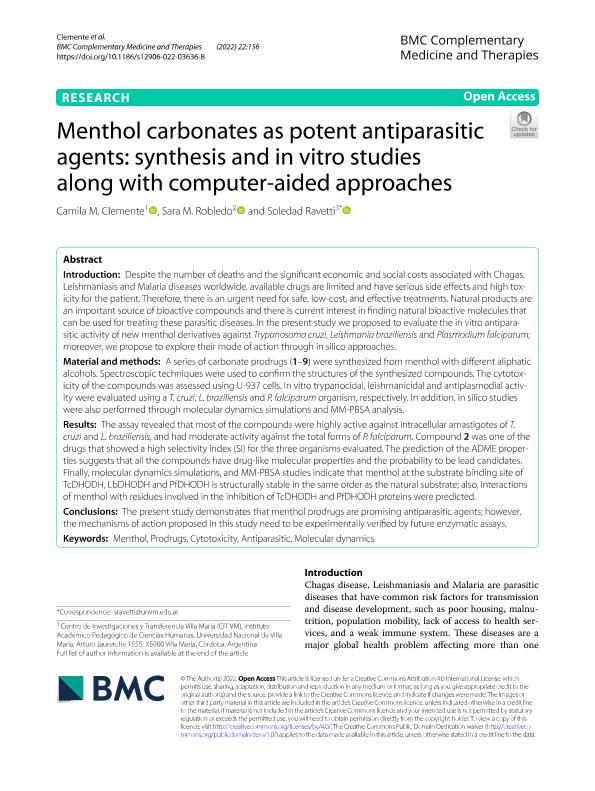Mostrar el registro sencillo del ítem
dc.contributor.author
Clemente, Camila Mara

dc.contributor.author
Robledo, Sara M.
dc.contributor.author
Ravetti, Soledad

dc.date.available
2023-08-11T14:17:31Z
dc.date.issued
2022-06
dc.identifier.citation
Clemente, Camila Mara; Robledo, Sara M.; Ravetti, Soledad; Menthol carbonates as potent antiparasitic agents: synthesis and in vitro studies along with computer-aided approaches; BioMed Central; Bmc Medicine; 22; 156; 6-2022; 1-14
dc.identifier.issn
1741-7015
dc.identifier.uri
http://hdl.handle.net/11336/207901
dc.description.abstract
Introduction: Despite the number of deaths and the significant economic and social costs associated with Chagas, Leishmaniasis and Malaria diseases worldwide, available drugs are limited and have serious side effects and high toxicity for the patient. Therefore, there is an urgent need for safe, low-cost, and effective treatments. Natural products are an important source of bioactive compounds and there is current interest in finding natural bioactive molecules that can be used for treating these parasitic diseases. In the present study we proposed to evaluate the in vitro antiparasitic activity of new menthol derivatives against Trypanosoma cruzi, Leishmania braziliensis and Plasmodium falciparum; moreover, we propose to explore their mode of action through in silico approaches. Material and methods: A series of carbonate prodrugs (1–9) were synthesized from menthol with different aliphatic alcohols. Spectroscopic techniques were used to confirm the structures of the synthesized compounds. The cytotoxicity of the compounds was assessed using U-937 cells. In vitro trypanocidal, leishmanicidal and antiplasmodial activity were evaluated using a T. cruzi, L. braziliensis and P. falciparum organism, respectively. In addition, in silico studies were also performed through molecular dynamics simulations and MM-PBSA analysis. Results: The assay revealed that most of the compounds were highly active against intracellular amastigotes of T. cruzi and L. braziliensis, and had moderate activity against the total forms of P. falciparum. Compound 2 was one of the drugs that showed a high selectivity index (SI) for the three organisms evaluated. The prediction of the ADME properties suggests that all the compounds have drug-like molecular properties and the probability to be lead candidates. Finally, molecular dynamics simulations, and MM-PBSA studies indicate that menthol at the substrate binding site of TcDHODH, LbDHODH and PfDHODH is structurally stable in the same order as the natural substrate; also, interactions of menthol with residues involved in the inhibition of TcDHODH and PfDHODH proteins were predicted. Conclusions: The present study demonstrates that menthol prodrugs are promising antiparasitic agents; however, the mechanisms of action proposed in this study need to be experimentally verified by future enzymatic assays.
dc.format
application/pdf
dc.language.iso
eng
dc.publisher
BioMed Central

dc.rights
info:eu-repo/semantics/openAccess
dc.rights.uri
https://creativecommons.org/licenses/by/2.5/ar/
dc.rights.uri
https://creativecommons.org/licenses/by/2.5/ar/
dc.subject
ANTIPARASITIC
dc.subject
CYTOTOXICITY
dc.subject
MENTHOL
dc.subject
MOLECULAR DYNAMICS
dc.subject
PRODRUGS
dc.subject.classification
Otras Ciencias Químicas

dc.subject.classification
Ciencias Químicas

dc.subject.classification
CIENCIAS NATURALES Y EXACTAS

dc.title
Menthol carbonates as potent antiparasitic agents: synthesis and in vitro studies along with computer-aided approaches
dc.type
info:eu-repo/semantics/article
dc.type
info:ar-repo/semantics/artículo
dc.type
info:eu-repo/semantics/publishedVersion
dc.date.updated
2023-06-26T13:36:56Z
dc.identifier.eissn
2662-7671
dc.journal.volume
22
dc.journal.number
156
dc.journal.pagination
1-14
dc.journal.pais
Reino Unido

dc.journal.ciudad
Londres
dc.description.fil
Fil: Clemente, Camila Mara. Consejo Nacional de Investigaciones Cientificas y Tecnicas. Centro Cientifico Tecnologico Conicet - Cordoba. Instituto Multidisciplinario de Investigacion y Transferencia Agroalimentaria y Biotecnologica. - Universidad Nacional de Villa Maria. Instituto Multidisciplinario de Investigacion y Transferencia Agroalimentaria y Biotecnologica.; Argentina
dc.description.fil
Fil: Robledo, Sara M.. Universidad de Antioquia; Colombia
dc.description.fil
Fil: Ravetti, Soledad. Consejo Nacional de Investigaciones Científicas y Técnicas. Centro Científico Tecnológico Conicet - Córdoba. Centro de Investigaciones y Transferencia de Villa María. Universidad Nacional de Villa María. Centro de Investigaciones y Transferencia de Villa María; Argentina
dc.journal.title
Bmc Medicine

dc.relation.alternativeid
info:eu-repo/semantics/altIdentifier/url/https://bmccomplementmedtherapies.biomedcentral.com/articles/10.1186/s12906-022-03636-8
dc.relation.alternativeid
info:eu-repo/semantics/altIdentifier/doi/http://dx.doi.org/10.1186/s12906-022-03636-8
Archivos asociados
